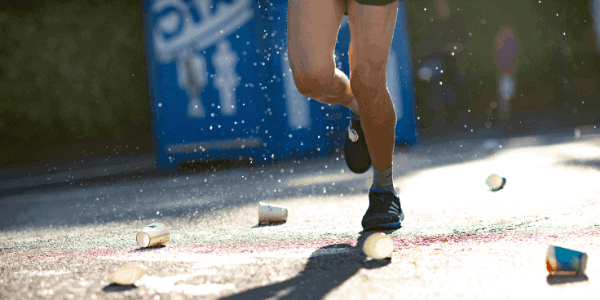Do you have runner’s gut, runner’s stomach, or get the runner’s trots?
You know the feeling… well there’s a very good chance you do, as up to 50% of athletes can suffer gut problems during exercise, and most often that occurs during a run.
Not sure what I am talking about? If you’ve experienced bloating, discomfort, nausea, wind, urgency and even diarrhoea then this could include you.
This is THE number one nutrition concern that athletes ask me about – it is so common that I want to delve into the causes so you avoid this happening in your next race.
Because let’s face it, when you’ve put in the hard training, you can’t afford your race to be derailed by time in the portaloo…
Who does Runner’s Gut affect?
Studies show that runners are more likely to be affected than other athletes. If you are young, female, and prone to nervous anxiety then you are also more likely to be affected than average. Elite athletes can also suffer more than recreational athletes.
So, why does it even happen?
Put simply, while you are exercising your body directs blood flow away from the gut to fuel the exercise being performed… which leaves less blood flow for digestion. Running is a significant and demanding exercise that it tends to demand blood flow more than other forms of exercise.
What are specific causes of Runner’s Gut?
- Dehydration: Dehydration reduces blood volume and therefore blood flow to the gut, which can trigger the symptoms of Runner’s Gut. Starting out a session already dehydrated is just asking for trouble.
- Reduced blood flow to the gut: Exercise demands a lot of blood flow, and this can cause nausea, abdominal pain, vomiting and diarrhoea. Eating a meal within 2 hours of exercise can exacerbate this problem, as the gut needs time to digest food prior to the demands of exercise.
- Type of food prior to exercise: Consuming foods that are high in fibre, fat and protein before exercise can spell trouble – these are slower to empty from the stomach than carbohydrates and can cause significant discomfort if not digested prior to exercise.
- Carbohydrate concentration: Consuming products with >10% carbohydrate concentration can irritate the stomach. Sports drinks in in the range of 4-8% are less likely to cause gut upset (Bindi is 6%) and be careful to mix them correctly. Concentrated carbohydrate products can be problematic for many athletes.
- Carbohydrate type: Using a single source carbohydrate sports drink (eg sucrose or glucose) means all the carbs need to be digested through one absorption pathway. Using a combined carbohydrate product (eg maltodextrin/fructose like Bindi) means two separate pathways are utilised, allowing quicker absorption. This reduces that ‘slushy gut’ feeling and means the carbs are absorbed quicker and much more comfortably.
- Hormones: Intense exercise like running will signal the release of the stress hormone cortisol, which can contribute to a sense of ‘urgency’. Add in nervous anxiety or race day apprehension and these stress hormones can play a big part.
- Specific medical conditions: Athletes with specific conditions such as lactose or fructose intolerance, coeliac disease or irritable bowel syndrome can find their symptoms exacerbated during exercise.
- Irritants: Some athletes will find caffeine irritates their gut, and that pre-race shots (eg beetroot or BCAAs) and NSAID anti-inflammatories can also be an issue. Don’t try any of these prior to a race if you haven’t tested them extensively in training.
Whoah. That’s a lot of problems right…?
But, chances are, by thinking through your training and race day routines you will pin point an area that is triggering your gut symptoms.
Although there are several factors that can be involved in Runner’s Gut, there is an approach that will work for most athletes…
CONCLUSION:
Our takeaway advice to minimise your risk of tummy troubles:
- Reduce fibre load for 2-3 days prior to racing
- Start hydrated and keep hydrated
- Eat 2-4 hours before racing (a carb rich meal, avoiding excess protein, fat and fibre)
- Use a combined carb sports drink and avoid concentrated carbs
- Don’t try anything new on race day (practice all your nutrition regularly and train your gut to absorb carbs)
- Stay calm (OK – this one might be harder said than done… but learning to control your race day anxiety has a lot of benefits!)
And what to do if the symptoms do hit during a race?
- Slow down to let some blood flow back into your GI tract
- Sip some cold water (it is slower to pass through than warm water)
- Use the loo (the urgency isn’t likely to go away on its own)
- Make sure to take on some carbs too if you haven’t had enough
- Gradually work to get yourself back on track.
If you are looking to try products that are specifically designed to be gentle on your stomach, order our sample pack:
Do you suffer from runner’s gut? I would love to hear from you – let me know how you handle it on race day by commenting below!
Cheers,
Belinda
